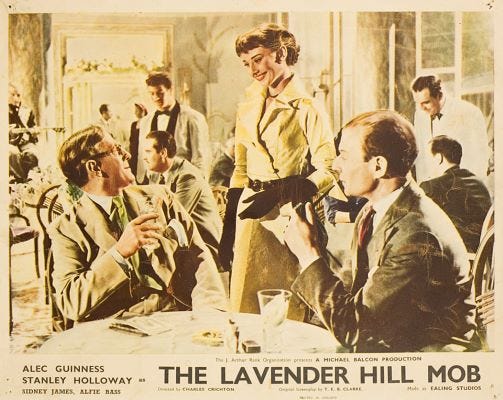The Lavender Hill Mob / The Captain's Paradise
Two amusing early-50s Alec Guinness movies. One starts great and ends OK; the other starts poorly and ends nicely. Choose!

The Lavender Hill Mob (1951). Grade: B-. The Captain’s Paradise (1953). Grade: C+
Hey, did you know that the Vatican has a Best Films list? I didn’t! It’s called “Some Important Films (Italian: Alcuni film importanti),” per Wiki. 2001’s on it, which would have annoyed my fundamentalist dad. It came out in 1995, so I’m sure the updated version will include Spotlight, right?
Anyways, The Lavender Hill Mob is on there, and it definitely has its moments. Watch this one before you watch fellow papally-honored Fantasia, it’s more fun. (Unless you’re on hallucinogens, in which case probably Fantasia and 2001 are more fun than this.)
Alec Guinness is a prim, proper employee of the Bank of England who oversees the shipment of gold bars. He’s reliable, dependable, by-the-book, and for these reasons his bosses think he’s a nothingburger. Someone without any drive or ambition. (Wouldn’t that be exactly what you want at the Bank of England? It’s not a hedge fund.)
So he’s dreamed, for years, of robbing them absolutely blind. He doesn’t know how to do it, though, until a new tenant moves into his boarding house. The new tenant (Stanley Holloway) is a just-getting-by sculptor and painter who exports cheap lead Eiffel Tower models to France, painted in gold leaf. And Guinness thinks, hey, maybe we could actually smuggle real gold out this way…
For those of you who know your musicals, Stanley Holloway was the guy who sang “With a Little Bit Of Luck” in My Fair Lady, and he’s really charming here. He’s not even going along with the scheme because he’s especially greedy, or to stick it to his bosses; he just likes it because it’s fun. You want Holloway to get away with it, even more than you want Guinness to, because he just seems like a nice guy. (And one friend said Holloway “was the nicest man I ever knew.”)
Guinness has great bits, too; when he’s accepting faint praise from his bosses while planning to rip them off, and especially once he’s ripped them off and mistakenly thought to be a hero. It’s kinda like a genteel English version of “Take This Job And Shove It.”
Because of the censorship standards of the time — and maybe because Ealing Studios head Michael Bacon was a rather genteel sort, himself — Holloway and Guinness can’t get away with it; crime doesn’t pay. And that’s when the movie loses steam.
The heist itself has a nifty misfire you can easily believe in; it’s tense and funny. But the unraveling that leads to everything going wrong later is sloppily thought out. It centers on how a French importer doesn’t understand the difference between how you say the letter “R” in English and how you say it in French. Although the importer speaks both languages! She would know this.
And this leads to one bad decision after another, and I couldn’t believe in any of them, and I just found this increasingly annoying. It’s happily not one of those endings where everybody murders everybody else, but it’s more frustrating than funny. Not enough that I didn’t still love the first half! Just frustrating.
There’s neat little roles for Sid James and Alfie Bass; the cinematography by Douglas Slocombe is very solid.
The Captain’s Paradise is pretty irritating for the first half, then gets more interesting, and ends up enjoyably. Guinness plays a ferryboat captain going between Gibraltar and Morocco. He’s got a wife in both; neither knows about the other. One’s a domestic goddess/homemaker, the other a sultry singer/dancer. It’s the Madonna and the whore.
Early on, Guinness tells his proper homemaker wife that “man toils, woman spins.” (As in a spinning wheel for thread.) And she’s giddy about this arrangement. Until… she’s not. And neither’s her counterpart in Morocco, not forever.
The real joy here is Celia Johnson as the proper homemaker. You might remember her suffering nobly through an unsatisfying marriage in Brief Encounter. Here, when she gets sick of Guinness, she doesn’t suffer nobly — she just refuses to take his crap any more. Without one smidgen of self-pity, or even malice; it’s just “you had your shot, buddy, and you blew it bigtime.”
I think this could be a good educational film for long-married husbands. You know, just because you’re married, doesn’t mean you should stop dating your wife! Keep trying to be an enjoyable person to hang around! If you can!
The Moroccan wife — the sultry “ethnic” one — is played by Yvonne De Carlo, of French/Sicilian/Canadian/New Zealand heritage. She got cast as the “ethnic” quite a bit, as a Native American and as Salome. Apparently she’s the person who really wanted Guinness for this part. She wasn’t wrong.
When his dual love nests start coming apart, Guinness has a great wounded look to him. He’s honestly amazed that the ladies want something more; hadn’t he bought them presents? It’s a self-satisfied oaf getting what he deserves.
The sharp-eyed among you will recognize Peter Bull as a Moroccan firing-squad commander. He was the German ship commander in The African Queen, and a Soviet ambassador in Dr. Strangelove. He’s only in this for a minute or two, but if he looks familiar, now you know why.
Per Wiki, this was originally going to star Lawrence Olivier and Vivian Leigh, with Olivier directing? Seems a little out of place for Olivier. The plot got turned into a Brodway musical, directed and co-written by José Ferrer — yep, the guy who played Cyrano! Who was married five times himself, although those were consecutive, not concurrent. Twice to Rosemary Clooney, whose nephew’s name is George. And come to think of it, George might be actually pretty good in the Guinness part…



